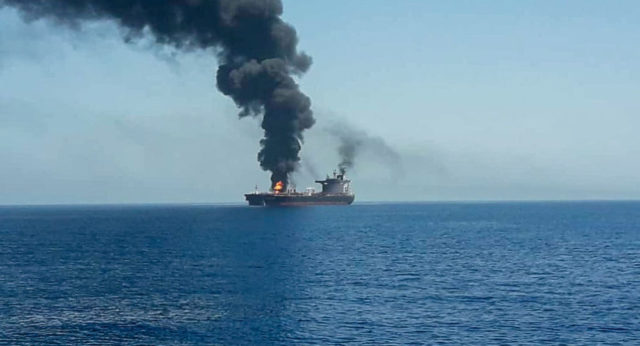For Minnesota Rep. Ilhan Omar, the world must start fresh every day. That would explain her ignorance on Iran.
“None of this [tension] would be happening if Trump didn’t back out of the Iran nuclear deal,” Omar said on Twitter. “America’s response should be to return to the table and reinstate the Iran nuclear deal. Increasing tensions and threats of war serve nobody’s interests.”
For her, history began when President Trump withdrew from President Obama’s unsigned, unratified 2015 Joint Comprehensive Plan of Action (JCPOA or “Iran deal”). In reality, it began much sooner, and the U.S. is finally pushing back against years of Iranian aggression.
Start instead in 1979 — when the Islamic Republic came into being, took over the U.S. embassy and held Americans hostage for 444 days while crowds chanted, “Death to America.” The fact that Omar wasn’t born yet is irrelevant.
The 1980s marked the start of Iran’s occupation of Lebanon and the start of Hezbollah as its proxy. In 1983, Hezbollah blew up the U.S. Marine barracks in Beirut, killing 220 Marines and 21 other American military personnel. A second suicide bomber struck the French barracks, killing 58 French soldiers and wounding 15. Hezbollah blew up the Khobar Towers in 1996, killing 19 Americans and injuring 372.
Iran built weapons factories in both Lebanon and Syria, though Israeli attacks slowed or stopped their progress in some places. In December 2006, a United Nations Security Council resolution embargoed the export of nuclear weapons technology to Iran; in March 2007, the UNSC added an embargo on arms exports from Iran. In September of that year, Israel destroyed Iran’s nuclear facility in Syria. In June 2010 the UN embargoed the export of most major conventional weapons to Iran.
Iran’s relationship with Palestinian Hamas and Islamic Jihad are long and expensive, resulting in American and Israeli casualties from terror and rocket barrages.
In 2011, there was an Iranian plot to kill a Saudi diplomat in Washington, D.C., and to attack the Israeli and Saudi embassies. That year, too, Iran began to take steps to mine the Persian Gulf.
In 2012, chairman of the Iranian chiefs of staff, Hassan Firuzabadi, said, “We do have the plan to close the Strait of Hormuz, since a member of the military must plan for all scenarios.” The head of the economic commission of the Iranian parliament, Arsalan Fathipour, said Iran wouldn’t necessarily wait for military action against his country. “If we completely go under the sanctions, we will not let a single drop of oil pass through the Hormuz Strait.”
U.S. Naval Intelligence shows Iranian warships in the Red Sea — where Iran has no border — since 2011. Part of Iran’s support for the Houthi rebellion in Yemen is positioned near the U.S. Expeditionary Force base in Djibouti, close to the Straits of Hormuz. Iran has provided missiles and training to the Houthis that enabled them to take down an American drone.
Iranian war games in 2015 were designed against American forces and included passing skills along to proxy forces. Beginning in 2016, swarms of Iranian fast boats harassed American ships and others in the Persian Gulf, engaging in what the commander of the U.S. Central Command called “unsafe maneuvers.” Iran captured American sailors and released video footage of them — a violation of their rights under the Geneva Convention.
In 2018, U.S. intelligence revealed that Iran was responsible for more than 600 American military deaths in Iraq. U.S. intelligence has also said Iran was responsible for attacking tankers in the Gulf this month.
But according to Omar and much of the media, the United States is ratcheting up tension.
After 40 years of Iranian aggression, we should wonder why it took so long for the U.S. to take steps to protect American interests and allies, and why those allies might not be prepared to stand beside us. Unfortunately, Omar can’t seem to figure it out.






